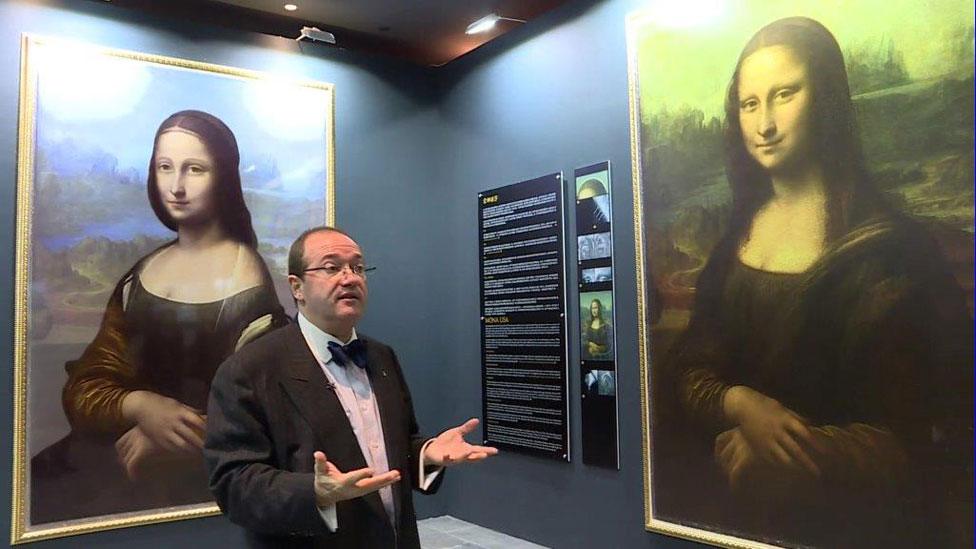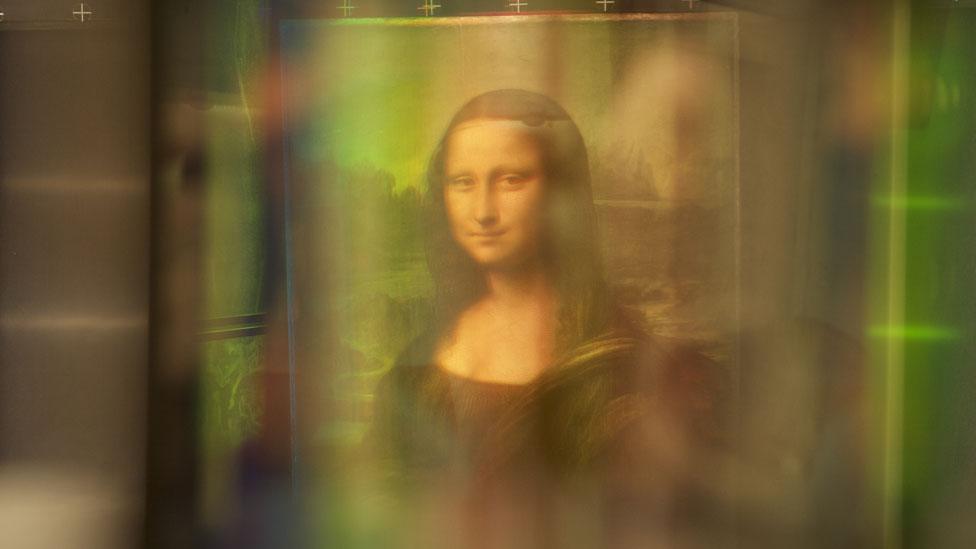Hidden portrait 'found under Mona Lisa', says French scientist
- Published

The image on the left is a digital reconstruction of what Mr Cotte claims to have found underneath the Mona Lisa
An image of a portrait underneath the Mona Lisa has been found beneath the existing painting using reflective light technology, according to a French scientist.
Pascal Cotte said he has spent more than 10 years using the technology to analyse the painting.
He claims the earlier portrait lies hidden underneath the surface of Leonardo's most celebrated artwork.
A reconstruction shows another image of a sitter looking off to the side.
The Louvre Museum has declined to comment on his claims because it "was not part of the scientific team".
Could there be an earlier portrait underneath the world famous Mona Lisa?
Instead of the famous, direct gaze of the painting which hangs in the Louvre Museum in Paris, the image of the sitter also shows no trace of her enigmatic smile, which has intrigued art lovers for more than 500 years.
But Mr Cotte's claims are controversial and have divided opinion among Leonardo experts.

Will Gompertz, Arts Editor
I'm sceptical. It's perfectly common for an artist to overpaint an image as it is for a client who's commissioned that artist to ask for changes. So it's not surprising that there are those underpaintings on the Mona Lisa.
The data that the technology generates is open to interpretation, which needs to be analysed and corroborated by the academic and curatorial community, and not just an individual. I think the Louvre's decision not to make a comment is telling.
This is the world's most famous painting which, like a celebrity, always makes for a good story. But in this case I think caution is required.

The scientist, who is the co-founder of Lumiere Technology in Paris, was given access to the painting in 2004 by the Louvre.
He has pioneered a technique called Layer Amplification Method (LAM), which he used to analyse the Mona Lisa.

Light technology was used on the famous painting
It works by "projecting a series of intense lights" on to the painting, Mr Cotte said. A camera then takes measurements of the lights' reflections and from those measurements, Mr Cotte said he is able to reconstruct what has happened between the layers of the paint.
The Mona Lisa has been the subject of several scientific examinations over more than half a century. More recent techniques include infrared inspections and multi-spectral scanning.
But Mr Cotte has claimed his technique is able to penetrate more deeply into the painting.
He said: "We can now analyse exactly what is happening inside the layers of the paint and we can peel like an onion all the layers of the painting. We can reconstruct all the chronology of the creation of the painting."
'Shatter many myths'
Leonardo is believed to have worked on the painting between 1503 and 1517 while working in Florence and later in France.
There has long been debate about the Mona Lisa's identity. But for centuries, it has been widely believed that she is Lisa Gherardini, the wife of a Florentine silk merchant.
But Mr Cotte has claimed his discoveries challenge that theory. He believes the image he has reconstructed underneath the surface of the painting is Leonardo's original Lisa, and that the portrait named Mona Lisa for more than 500 years is, in fact, a different woman.
He said: "The results shatter many myths and alter our vision of Leonardo's masterpiece forever.
"When I finished the reconstruction of Lisa Gherardini, I was in front of the portrait and she is totally different to Mona Lisa today. This is not the same woman."
He also claims to have found two more images under the surface of the painting - a shadowy outline of a portrait with a larger head and nose, bigger hands but smaller lips. And he says he has found another Madonna-style image with Leonardo's etchings of a pearl headdress.
'Mona Lisa is Lisa'
But Martin Kemp, Emeritus Professor of the History of Art at the University of Oxford, is not convinced.
Professor Kemp said: "They [Cotte's images] are ingenious in showing what Leonardo may have been thinking about. But the idea that there is that picture as it were hiding underneath the surface is untenable.
"I do not think there are these discrete stages which represent different portraits. I see it as more or less a continuous process of evolution. I am absolutely convinced that the Mona Lisa is Lisa. "
Art historian Andrew Graham-Dixon has made a new BBC documentary called The Secrets of the Mona Lisa, studying historical documents linked to the painting alongside Mr Cotte's scientific findings.
Mr Graham-Dixon said: "I have no doubt that this is definitely one of the stories of the century.
"There will probably be some reluctance on the part of the authorities at the Louvre in changing the title of the painting because that's what we're talking about - it's goodbye Mona Lisa, she is somebody else."
Mr Cotte announced the findings of his latest research at a press conference in Shanghai on Tuesday.
They will be included in an exhibition, Da Vinci - The Genius, which features displays of his research on the Mona Lisa over the last 11 years.
The show has travelled around the world and opens in Shanghai this week.
The Secrets of the Mona Lisa is on BBC Two at 21:00 GMT on 9 December.